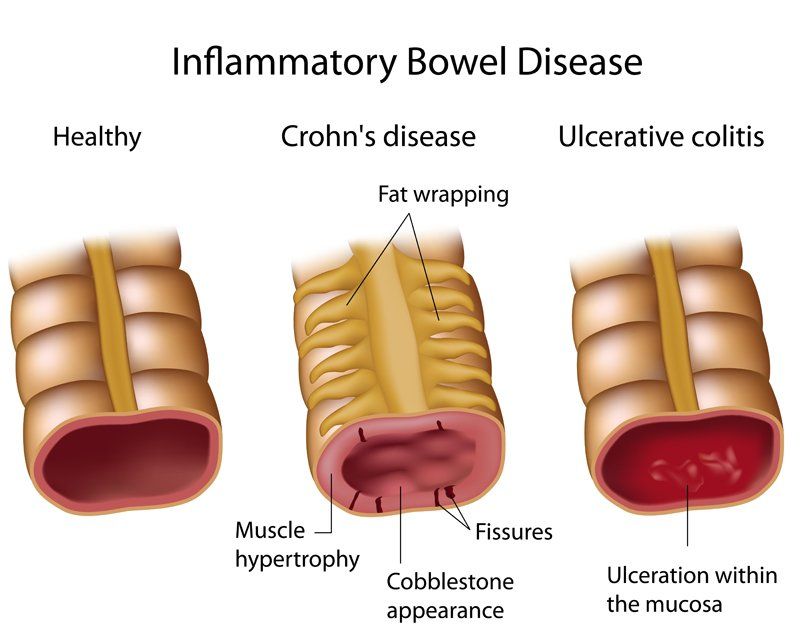What is Inflammatory Bowel Disease?
Inflammatory bowel disease (IBD) does not meet the exact criteria for an autoimmune disease, but it does occur because of an incorrectly functioning immune system. Doctors include two chronic conditions affecting the digestive system under IBD: Crohn's Disease and Ulcerative Colitis.
The conditions have similar symptoms but affect different areas of the digestive tract. People with IBD often experience flare-ups of severe complications and have days or weeks where they remain relatively symptom-free. IBD can cause damage to the GI tract and may require surgery to remove portions of the damaged intestine.
Common Symptoms of Inflammatory Bowel Disease
The symptoms of IBD can mimic the side effects of food intolerances or a stomach virus. Detecting the difference can mean delaying treatment to see if the problems correct on their own or if a diet change solves the issue.
However, experts suggest people do not wait too long for professional care because the condition can cause permanent damage to the intestinal tract.
Symptoms often include:
- Repeated bouts of diarrhea
- Severe abdominal pain
- Fatigue
- Weight loss
- Blood in stools/rectal bleeding
- Failure to thrive (children)
- Skin rashes
- Liver complications
- Joint pain
Common Causes of Inflammatory Bowel Disease
IBD occurs because the immune system responds aggressively to normal triggers and causes inflammation in the gastrointestinal (GI) tract. Why the problem occurs is not always evident. Research indicates genetics can play a role because the condition often affects people with a family history of IBD. However, anyone can develop IBS, as many patients do not have a family history of the disease. The disease affects both genders and can begin in childhood.
How the Medical Community Treats Inflammatory Bowel Disease
Unfortunately, doctors only treat the symptoms of IBD and attempt to keep them under control to reduce the damage to the GI tract. The treatment usually includes anti-inflammatory and immunosuppressive medications. In addition, antibiotics can help relieve conditions in IBD patients when symptoms worsen due to infections.
Some doctors recommend patients switch to a liquid diet during flare-ups to allow the digestive system to rest and heal. In addition, recent research has encouraged the medical community to recommend probiotics to raise the level of beneficial bacteria in the gut.
Children with the condition have added risks because IBD can make it hard to get the nutrition they need to grow correctly. Delayed puberty can also occur for this reason. Children may need all their vaccines and extra testing before beginning treatment for IBD because some medications make it difficult to fight infections. The drugs used for IBD can have side effects, and long-term use (such as starting treatment in childhood) can put the patient at a higher risk of complications.
How Inflammatory Bowel Disease Can Be Treated with Natural Remedies
Alternative healing practices have very few risks. The options offer non-invasive and pain-free methods to improve GI tract health. Regulating the good and bad bacteria in the gut, reducing stress levels, and boosting the immune system form the basis of many alternative practices. IBD patients who have failed to get the help needed from prescriptions or want safer treatments should consider homeopathic options.
See Your Local Holistic Practitioner. These can include muscle testers like Applied Kinesiologists and Nutrition Response Testers, many of whom are Chiropractors. You can also consider Functional and Integrative Medical Practitioners, many of whom are holistic doctors. Depending on your symptoms, trained Dietitians and Nutritionists can also be an option.
Adding
whole food supplements to your treatment plan adjusts the imbalances in your body. Being under a professional's care will help eliminate trial and error, and wasted money spent on remedies that may not be appropriate for your exact illness. Most holistic practitioners offer a free consultation, so seeing two or three is an option. It would be wise to start here.
- Supplements and Nutritional Adjustments: An anti-inflammatory diet that includes immune-boosting foods can help many conditions. Alternative practitioners also use whole food supplements, probiotics, and prebiotics for a regulated immune system and a healthier gut.
- Stress Reductions: Massage, yoga, and meditation, among many other options can help people relax. Anxiety and emotional stress often cause or worsen health problems. Many patients with IBD see their conditions begin or worsen during excessively stressful times. Learning mindfulness and stress-reducing techniques can give people more control over their health.
- Stabilizing the Body: IBD occurs because the system does not function correctly. Alternative healing methods like acupuncture and chiropractic manipulation help correct dysfunction in the body. Properly aligned bodies allow the blood to circulate properly and the nervous system to function better.
- Acupuncture improves circulation and can aid with stress reduction. However, acupuncture may not help all IBD sufferers. The treatment releases nitric oxide into the system. Some studies show patients may have their IBD successfully treated by blocking nitric oxide production, and others benefit from its presence. In cases where other treatments are not enough, an acupuncture session will determine if this method offers any benefit.
IBD patients can struggle to complete basic daily activities because of the pain and problems caused by their condition. It is possible for anyone to take charge of their health with natural solutions. Conventional medical treatments can offer some relief in some patients but rarely stops the symptoms and do not always protect against intestinal damage.
Alternative methods provide equally reliable symptom relief while focusing on healing the GI tract. Patients can safely incorporate alternative practices into their lives without needing to stop their prescriptions.
Additional Resources
- What is Inflammatory Bowel Disease (IBD)? - Centers for Disease Control and Prevention
- IBD - Kids Health
- A Natural Approach to Treatment of Inflammatory Bowel Disease - National Library of Medicine National Center for Biotechnology Information
- Nitric Oxide in Inflammatory Bowel Disease - Oxford Academic



